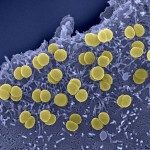Lien vers Pubmed [PMID] – 37279718
Lien DOI – 10.1159/000530151
Neonatology 2023 Jun; (): 1-7
The highest incidence of invasive meningococcal disease (IMD) is observed in infants. However, its prevalence in neonates (≤28 days of age) and the characteristics of the corresponding isolates are less described. This report aimed to analyze meningococcal isolates from neonates.We first screened the database of the national reference center for meningococci in France for confirmed neonatal IMD cases between 1999 and 2019. We then performed whole-genome sequencing on all cultured isolates, and we evaluated their virulence in a mouse model.Fifty-three neonatal cases of IMD (mainly bacteremia) were identified (50 culture-confirmed cases and 3 PCR-confirmed cases) of a total of 10,149 cases (0.5%) but represented 11% of cases among infants of under 1 year of age. Nine cases (17%) occurred among neonates of 3 days of age and younger (early onset). The neonate isolates were often of serogroup B (73.6%) and belonged to the clonal complex CC41/44 (29.4%) with at least 68.5% of coverage by vaccines against serogroup B isolates. The neonatal isolates were able to infect mice although to variable levels.IMD in neonates is not rare and can be of early or late onsets suggesting that anti-meningococcal vaccination can target women planning to have a baby.


